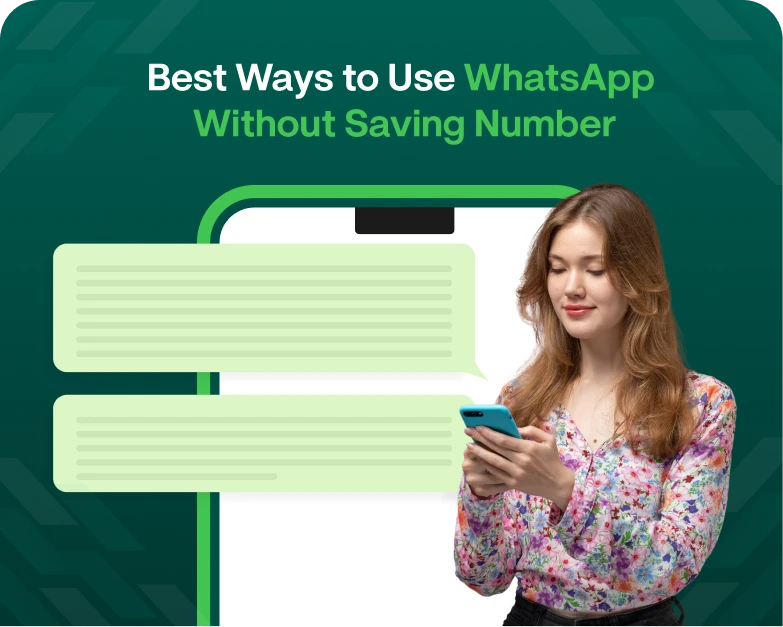Table of Contents
Introduction: Why Every Online Store Struggles with Growth
Imagine this: you’ve spent money on ads, made a great e-commerce website, and gotten people to visit it. However, your cart abandonment rate is going up, you have a lot of unanswered consumer questions, and repeat orders are unusual. Does this sound familiar?
People who shop today want to be able to talk to someone right away and have a shopping experience that is unique to them. People typically ignore email, and phone calls seem rude. But there is one channel where clients already spend a lot of time: WhatsApp for e‑commerce.
This blog will show you how to use WhatsApp for e‑commerce tools to get the most growth. We’ll go over the basics, talk about the benefits, offer you real-life examples, and even give you actionable steps to get started.
What is WhatsApp for online shopping?
Using WhatsApp Business API and automation technologies to talk to clients, make sales, and establish deeper relationships is what WhatsApp for e-commerce means. These features are different from the ordinary WhatsApp app in that they allow businesses to:
- Send out mass messages (seasonal campaigns, product launches, and discounts)
- Set up automatic order confirmations and shipment updates.
- Use chatbots or live operators to give customers help right away.
- Use WhatsApp analytics to see how many people are interacting with your posts and how many are converting.
- Use product catalogs to make shopping trips that are just right for you.
Think of it as making WhatsApp your one-stop shop for sales, marketing, and customer service.
Why WhatsApp is important for e-commerce
- This is why e-commerce companies all across the world are using WhatsApp tools:
- There are 2.8 billion users around the world, so your customers are already there.
- 98% of people open them, while just about 20% of emails do.
- Faster response times: clients get answers in minutes instead of hours.
- More people are interested in interactive features like buttons, product carousels, and quick replies.
To put it simply, WhatsApp is where shopping online meets ease.
Important WhatsApp Tools for Growing Your Business
1. Customer service on WhatsApp for online stores
No more waiting for answers to emails. You can do the following with WhatsApp:
- Answer questions right away (about size, shipping, and payment)
- Support several languages
- Easily move talks from bot to human
- Be there for your consumers when they need you most to build trust.
👉 A fashion store in India cut response time by 70% and boosted conversions by using a WhatsApp team inbox.
2. Use WhatsApp to get back to abandoned carts
Cart abandonment is the quiet killer of online stores’ profits. WhatsApp automation can help in the following ways:
- Sending soft reminders like “Hey, you forgot something in your cart!”
- Giving out free shipping or discount codes
- Providing personal help (“Do you need help finishing your order?”)
👉 For example, an online store noticed a 20% boost in recovered carts by sending timely WhatsApp reminders and offering minor rewards.
3. Use WhatsApp Analytics to make better choices
WhatsApp analytics enables you figure out how engaged your users are, just like Google Analytics records web traffic. You can keep track of:
- Rates of delivery and opening messages
- The number of clicks on product links
- Times of response
- Ratings of how happy customers are
This data makes sure that you’re not just sending messages without thinking about them; you’re improving campaigns depending on what people really do.
4. WhatsApp shopping and product catalogs
You can show off your products right in WhatsApp instead of making clients go to your website. Some benefits are:
- Shopping right away without having to switch apps
- Share product suggestions that are tailored to you
- Allow one-click transactions with payment integrations
5. Notifications and updates that happen automatically
- Keep in touch with clients at every step of their journey:
- Confirmations of orders
- Updates on shipping and delivery
- Alerts to restock
- Updates to the loyalty program
- This automation makes customers less worried and more trusting.
A Step-by-Step Guide to Using WhatsApp for Business
- Pick a WhatsApp Business API Provider
Find tools that offer scalable solutions, such as WBotz, Twilio, or Gupshup.
- Create a Verified Business Account
Get the green checkmark (official badge) to show that you are trustworthy.
- Connect to Your E-Commerce Platform
For easy automation, link WhatsApp to Shopify, WooCommerce, or Magento.
- Make flows that run on their own
For example, cart recovery, welcome greetings, frequently asked questions, and shipping updates.
- Teach Your Team
Make sure agents know how to combine automation with personal service.
- Track With WhatsApp Analytics
Measure KPIs including conversion rate, response time, and ROI.
- Make changes and improvements
Use what you learn from statistics to improve your marketing over time.
Pros of Using WhatsApp for Online Shopping
- Increase Sales: Get more people who look at your site to buy with timely nudges.
- Reduce Abandonment: Get back lost sales with automated cart reminders.
- Better Relationships: Create brand loyalty through intimate, conversational experiences.
- Cost-Effective: You can save money on call centers while still getting help 24/7.
- Data-Driven Growth: Use actual WhatsApp analytics to improve your marketing.
A D2C beauty brand in the real world
- A beauty e-commerce brand uses WhatsApp to:
- Send tailored skin care advice
- Get them to finish their purchases by sending them discount reminders.
- Help right away with order delays
- As a result, sales went up by 35% per month and repeat purchases went up by 50%.
Common Questions About Using WhatsApp for Business
Q1: Is it secure to use WhatsApp to handle consumer data?
Yes, WhatsApp Business API protects private information with end-to-end encryption.
Q2: Are WhatsApp tools affordable for tiny online stores?
Absolutely. Many providers provide pay-as-you-go pricing that is perfect for small businesses and startups.
Q3: Will people think WhatsApp marketing is spammy?
Not if you follow the guidelines for opting in and focus on individualized, value-driven communication.
Q4: How well does WhatsApp work to get people to finish their purchases compared to email?
WhatsApp messages are opened and answered more often than emails, and they often get back 2–3 times more carts.
Q5: Is it possible for WhatsApp to work with my CRM or e-commerce backend?
Yes, most WhatsApp platforms work well with CRMs, Shopify, WooCommerce, and other technologies.
Final Thoughts and a Call to Action
The landscape of e-commerce is changing, and firms that use WhatsApp tools early will have an edge over their competitors. WhatsApp isn’t just a chat app; it’s a growth engine for online stores. It can help with customer service, cart recovery, and data analysis.


